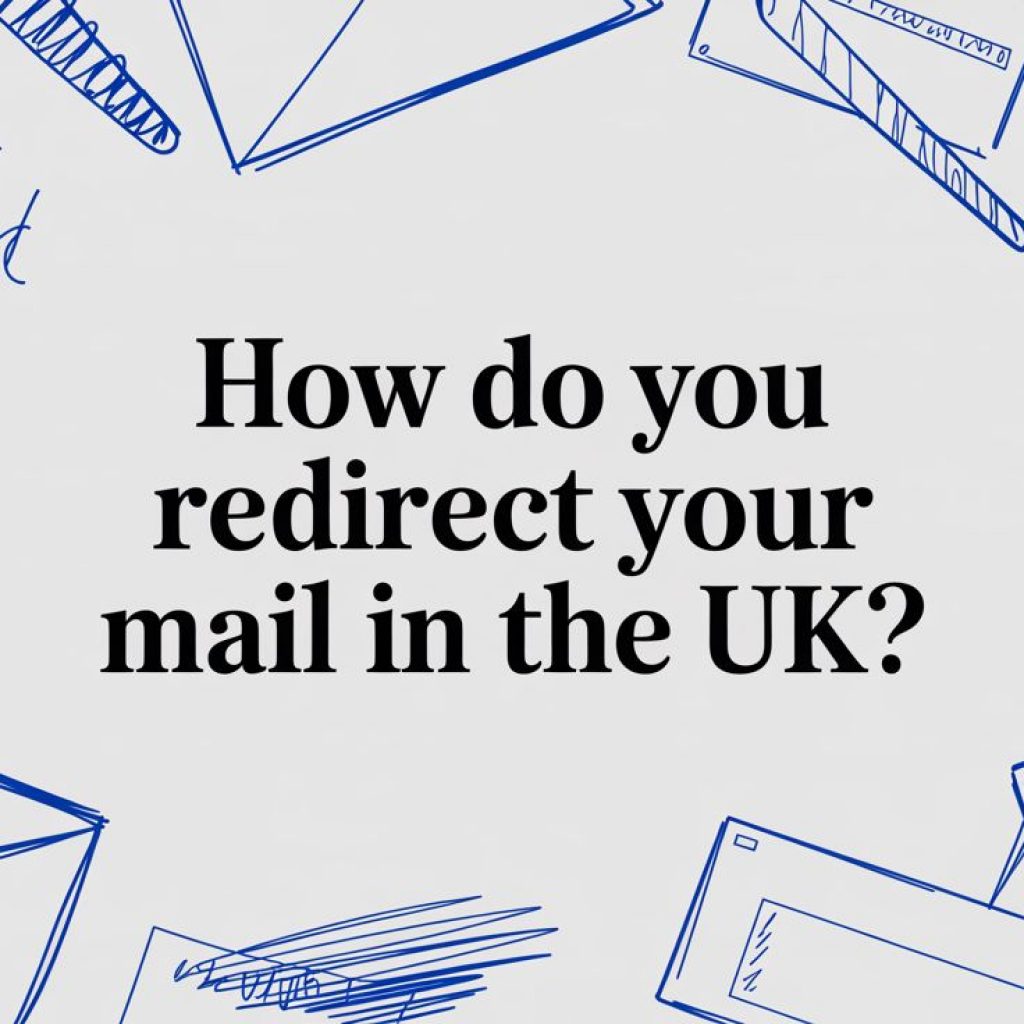Everything You Need to Know: Mail Forwarding Service
Everything You Need to Know: Mail Forwarding Service – A mail forwarding service in the UK gives you a stable, professional UK postal address where all your letters and parcels are received. From there, everything can be managed online and sent on to you, anywhere in the world. Think of it as a digital mailbox combined with a personal mail concierge, offering a brilliant solution for anyone needing a UK presence without being physically tied to a location.
How a UK Mail Forwarding Service Works
Imagine having a permanent UK address that isn’t attached to a specific house or office. That’s the simple idea at the heart of mail forwarding. It provides a secure, central hub for all your post, giving you complete control no matter where you are. This isn’t just for businesses, either; it’s a vital tool for expats, frequent travellers, and anyone managing their affairs from a distance.
The process couldn’t be more straightforward. Once you sign up, you’re given a unique UK address. You can then start using this address for all your postal needs—from bank statements and official government letters to personal cards and online shopping deliveries.
The Journey of Your Mail
When a letter or parcel lands at your new address, it enters a simple but highly efficient system designed entirely for your convenience. The provider’s trained staff handle every item securely, ensuring total confidentiality and care from the moment it arrives to its final destination.
This service essentially turns your physical mail into a digital asset you can manage from your phone or laptop. The infographic below breaks down the three core stages your mail goes through.
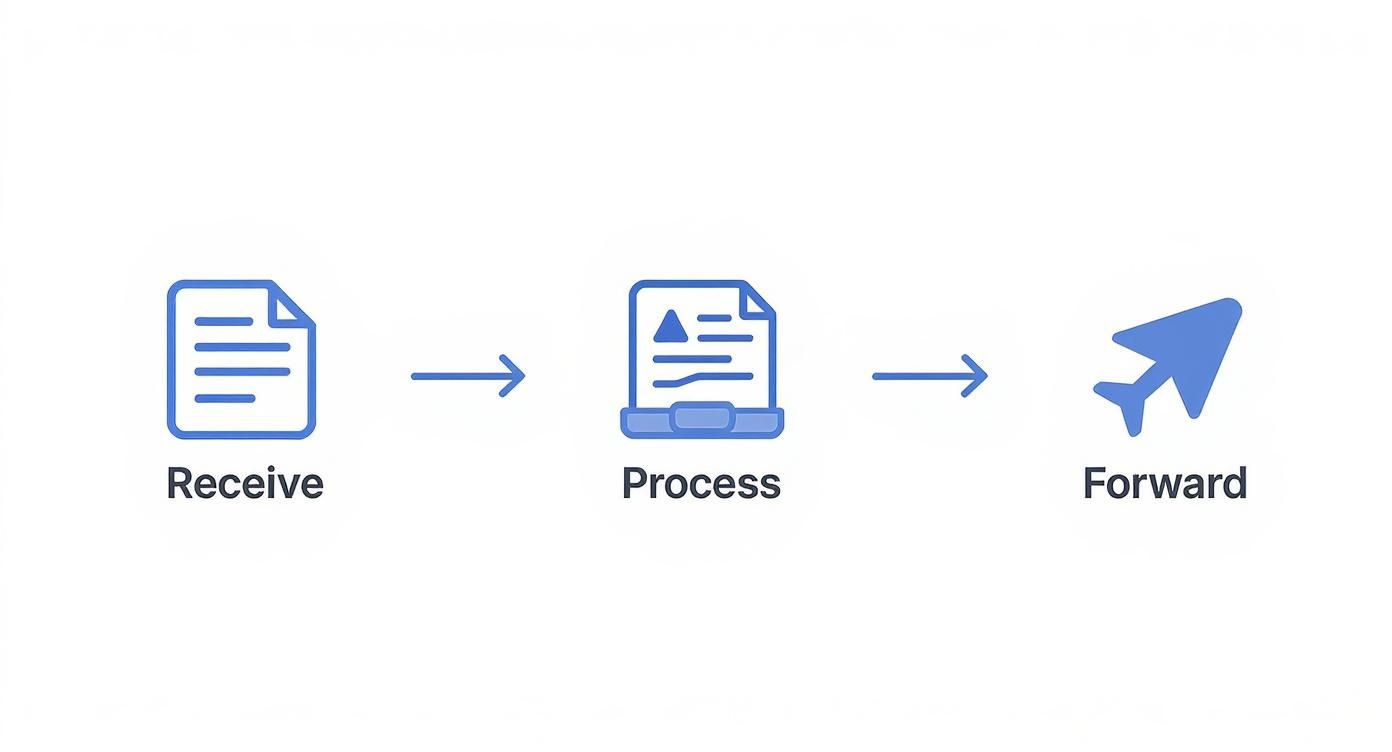
This visual really captures how the service acts as a bridge, connecting your physical post to your digital world or your current location, wherever that may be. It’s a system built on three key actions:
- Receive: Your mail and parcels are securely accepted at the service provider’s UK facility. This creates a single, reliable point of contact for all your correspondence.
- Process: As soon as it arrives, each item is logged into your online account. You get an instant notification, often with a scan of the envelope, so you know exactly what’s landed.
- Action: Now, you decide what happens next. You’re in the driver’s seat, with several options giving you ultimate control over every single piece of mail.
Your Options After Mail Arrives
Once your mail is logged, you just need to tell the provider what to do via your online portal. Your choices typically include:
- Scan and Read: The letter is opened, its contents are scanned, and it’s uploaded as a secure PDF to your account. This is perfect for urgent documents you need to see immediately. For instance, a contract arrives that needs your signature today. You can have it scanned, print it, sign it, and email it back within minutes. Checkout our professional Mail Forwarding Service
- Forward Physically: You can ask for the original letter or parcel to be shipped to your current address, whether you’re in another part of the UK or on the other side of the world. A practical example is receiving a replacement bank card; you can have it securely forwarded to your hotel in New York via a tracked courier.
- Checkout our professional Mail Forwarding Service
- Store Securely: If you don’t need an item right away, you can have it kept safely at the provider’s facility until you’re ready for it. This is useful for less urgent items or parcels you want to consolidate into a single shipment to save on postage. Checkout our Mailbox Rental Service
- Shred and Dispose: For junk mail or documents you no longer need, just request a secure shred and disposal. It keeps your account completely clutter-free.
To give you a clearer picture, here’s a simple table outlining how it all works from your perspective.
The Journey of Your Mail at a Glance
This table shows the typical lifecycle of a piece of mail handled by a forwarding service, from its arrival at your UK address to the moment you access it.
| Step | Action | What It Means For You |
|---|---|---|
| 1. Arrival | Your mail is delivered to your dedicated UK address and signed for by trained staff. | You never miss a delivery, even if you’re not in the country. |
| 2. Notification | The item is logged, and you receive an email or app notification, often with a scan of the envelope. | You have real-time visibility of all incoming mail without any delay. |
| 3. Decision | You log into your secure online portal to view the new item and choose an action. | You are in complete control of what happens next, from anywhere in the world. |
| 4. Execution | The provider carries out your instruction: scan, forward, store, or shred. | Your request is handled promptly and securely, getting you what you need, when you need it. |
This flow ensures you have a reliable and flexible way to manage post, turning a traditional chore into a simple online task.
A mail forwarding service effectively decouples your physical location from your postal address. This means you can move house, travel extensively, or run a business from anywhere without ever missing an important delivery or needing to update your address with every single contact.
This flexibility is a genuine game-changer for modern life and business. To learn more about the specific features available, you can explore the different types of mail forwarding services and find a plan that fits you perfectly.
Registered Office vs Service Address Explained
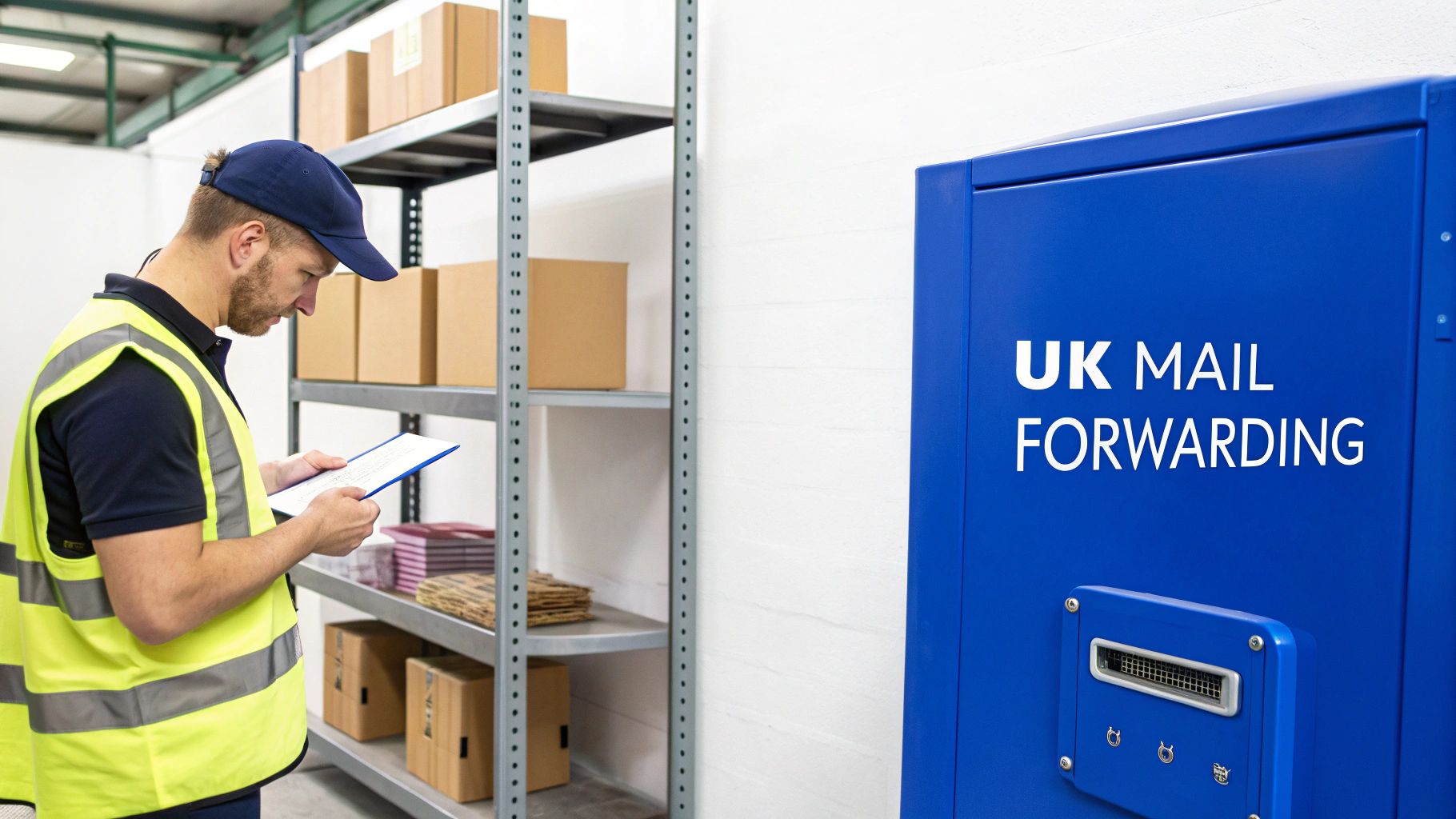
When you’re setting up a limited company in the UK, you’ll quickly run into a few specific legal terms for addresses. It’s easy to assume they’re all interchangeable, but in the eyes of the law, they serve very different purposes. Getting them wrong can lead to compliance headaches and, worse, put your personal information out in the open.
The three addresses you absolutely need to get straight are the Registered Office Address, the Director’s Service Address, and your everyday Business Trading Address. Each has a distinct legal role, and a good mail forwarding service in the UK is the perfect solution for managing them all without the stress.
Acorn Business Solutions offer a complete discounted package including Registered Office, Directors Service Address and Trading Address Want mail holding for collection? See Hold Everything. Want mail forwarding onto you by post or scan? See Forward Everything
The Official Face of Your Company
Think of your Registered Office Address as the official, public-facing address for your company. This is where all the important legal and statutory mail from government bodies like Companies House and HMRC will be sent. It has to be a physical UK address, and here’s the crucial bit: it’s published on the public record for anyone to see.
This is where many new business owners trip up. Using your home address might seem like the simplest option, but it means your private, residential address is out there for the world to find. This isn’t just about unwanted junk mail; it’s a serious privacy and security risk for you and your family.
Using a professional mail forwarding provider for your Registered Office is a smart, compliant strategy. It protects your home address from public view while ensuring all statutory mail is received securely and handled professionally.
For instance, a founder running a startup from their spare room in Manchester can use a registered office in London. This not only keeps their home address private but instantly projects a more established, credible image. If you want to dive deeper into this topic, our guide explains in more detail what is a registered office.
Where Your Director Mail Arrives
Next up is the Director’s Service Address. This is the official correspondence address for each individual company director, and just like the registered office, it’s also listed on the public record. All official mail from Companies House addressed to a director personally will land here.
The main difference is that this address is linked to the person, not the company. But the same privacy issues apply. If you use your home address here, that’s also going to be publicly available.
Practical Example: An International Director
Imagine a director living in Spain who is part of a UK-based company. They can use a UK service address to receive all their official mail. This solves a huge logistical problem, ensuring they meet their legal obligations without critical, time-sensitive documents getting lost or delayed in international post. A mail forwarding service makes this whole process completely seamless.
Differentiating Your Day-to-Day Operations
Finally, we have the Business Trading Address. This one is much more straightforward. It’s simply the place where you actually run your business—where you might meet clients, get deliveries from suppliers, or handle customer returns.
This address does not have to be the same as your Registered Office and isn’t typically listed on the Companies House public register. Let’s break down the key differences:
- Registered Office Address: A legal must-have for all limited companies. It’s a public, physical UK address for official government mail.
- Director’s Service Address: A legal requirement for every director. It’s their public contact address for personal statutory mail.
- Business Trading Address: This is where you actually work day-to-day. It could be an office, a co-working space, or your home, and it’s for operational mail like invoices and customer queries.
A mail forwarding service is the perfect solution, offering addresses that can tick all these boxes. You can use a single provider to handle your statutory mail legally while also managing your everyday business post, all while maintaining complete privacy and a professional front.
Who Really Needs Mail Forwarding?
A mail forwarding service is much more than a simple convenience. For many people and businesses, it’s an essential tool that solves very specific problems. Whether you’re a freelancer travelling the globe or a startup trying to punch above its weight, having a stable UK address that works for you offers a massive advantage. It gives you a reliable anchor in the UK, no matter where you are in the world.
The true value of this service clicks when you see how different people use it. It’s not a one-size-fits-all solution, but a flexible tool that adapts to your needs, giving you privacy, professionalism, and peace of mind.
UK Expats Managing Life From Abroad
For any Brit living overseas, keeping on top of official UK mail is a constant headache. Asking family or friends to handle important letters is a big ask, and international post can be painfully slow and unreliable. It’s an easy way to miss deadlines for tax notices or bank updates.
A mail forwarding service in the UK sorts this out instantly. An expat in Spain, for instance, can get an urgent letter from HMRC, have it scanned and waiting in their secure online portal the same day it arrives, and deal with it immediately. This completely removes the stress and delay, making sure they stay on top of their UK affairs without relying on anyone else.
A professional mail forwarding service gives expats a permanent, secure UK address they control. It ensures that critical documents related to banking, pensions, and government correspondence are handled efficiently, no matter where they are in the world.
This setup provides a seamless link back home, making admin straightforward and worry-free.
Digital Nomads and Frequent Travellers
The digital nomad lifestyle is all about freedom, but officialdom hasn’t quite caught up—it still demands a fixed address. Bouncing between countries makes it almost impossible to reliably receive bank cards, official letters, or even a birthday card from your nan. A mail forwarding service is the perfect fix: a stable UK postal anchor.
Picture a freelance graphic designer working from Thailand for six months before heading to Portugal. They can have their UK bank send a new debit card to their forwarding address, which then ships it securely to their current location via international courier. All their other mail, from tax reminders to personal letters, can be scanned for them to read online.
For anyone living a location-independent life, this service is a fundamental piece of the puzzle, providing stability without clipping their wings.
Startups and SMEs Building a Professional Image
For a new business, perception is everything. A startup run from a home office or a small regional town can instantly look more established and credible with a prestigious city address. This isn’t just about appearances; it’s a smart move to build trust with clients, partners, and investors.
Here’s how it helps businesses in practice:
- Boosts Credibility: A central London or Manchester address on your website and business cards seriously lifts your company’s professional game.
- Protects Your Privacy: It keeps the founder’s home address off public records, safeguarding personal privacy and creating a clean line between work and home life.
- Centralised Returns: E-commerce businesses can use the address as a consistent, professional returns hub, which smooths out logistics and improves the customer experience. For example, a customer returning a product sees a professional office address, not a residential one, increasing their confidence in the brand.
The demand for these kinds of solutions shows just how much business has changed. The UK’s Postal & Courier Activities industry is forecast to hit £28.5 billion in revenue by 2025. This growth is largely down to the e-commerce explosion that saw online retail sales jump from 19% in early 2020 to 26.2% by late 2024. It all points to a growing need for reliable mail and parcel handling—exactly what mail forwarding services provide. You can find more insights about the UK’s postal industry growth on IBISWorld.
Breaking Down the Costs and Pricing Plans
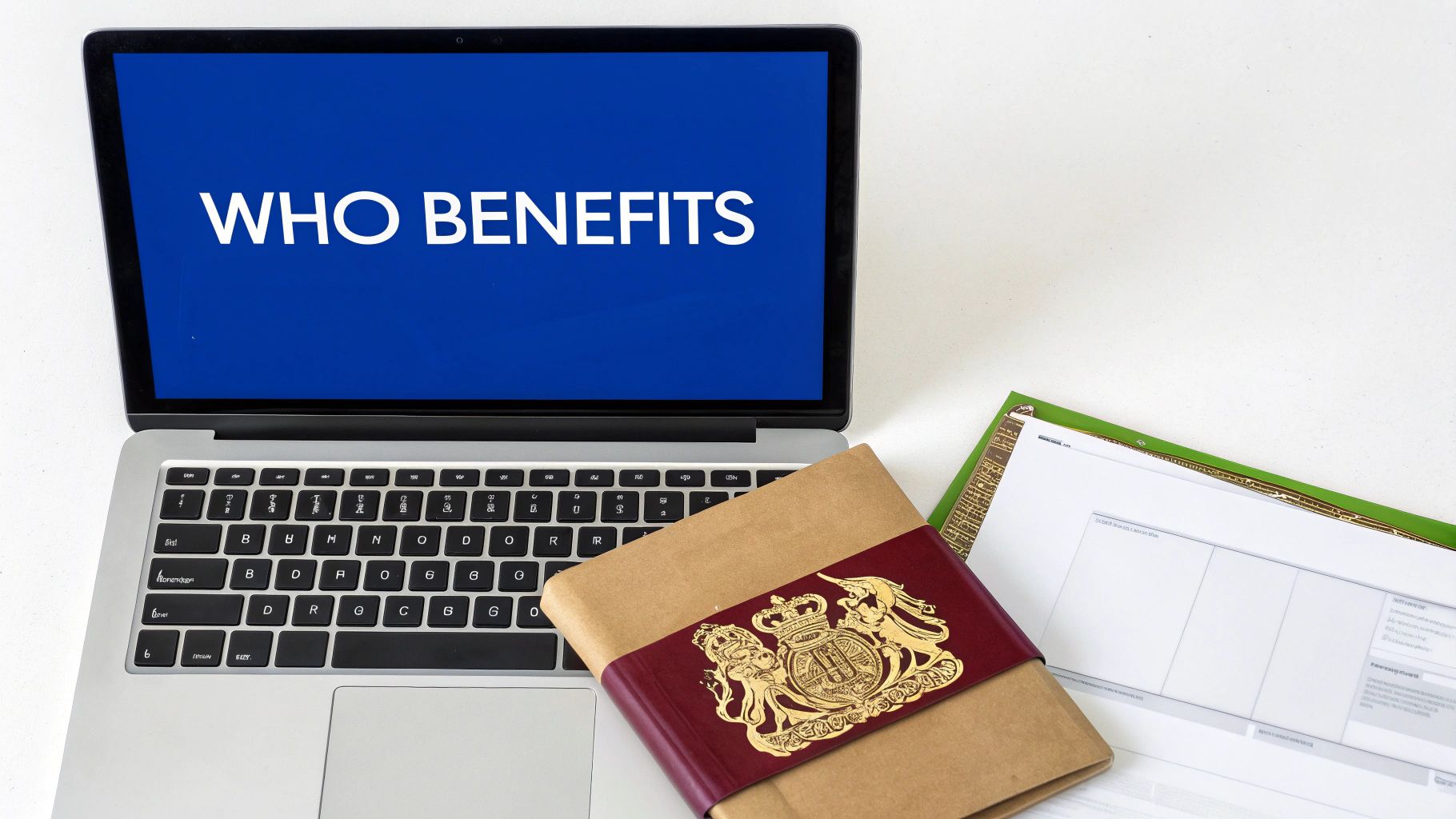
Getting to grips with the true cost of a mail forwarding service in the UK is the key to finding a partner that actually fits your budget and what you need. Pricing isn’t always a simple affair, with different models built for different types of users. By breaking down the common structures, you can sidestep any nasty surprises and choose with confidence.
Most providers build their pricing around two main approaches: Pay-As-You-Go (PAYG) plans and monthly or annual subscriptions. Each has its own perks, depending on how much post you’re expecting and the services you’ll actually use.
Monthly and Annual Subscriptions
For businesses or people who get mail more regularly, a subscription plan often works out as better value. These plans involve a fixed monthly or yearly fee that bundles in a set number of services, like a certain number of free scans or forwards each month.
Subscriptions give you predictable costs, which is a massive help for budgeting. They’re designed for higher-volume users, like an e-commerce business managing customer returns or a busy consultant receiving regular client post. Many providers offer tiered subscriptions, where higher-priced plans include more services, such as unlimited mail scans or free parcel handling.
Spotting the Hidden Fees
No matter which pricing model you’re looking at, it’s vital to read the small print to avoid getting stung by unexpected charges. A plan that looks like a bargain at first can quickly become expensive once you tally up the extras. Knowing what to look for is half the battle when comparing providers.
Keep an eye out for these common extra charges:
- Parcel Handling: Some basic plans only cover letters. If you receive parcels, especially larger or heavier ones, you could face a separate handling fee for each item. Actionable Insight: Before signing up, list the typical types and sizes of packages you expect to receive and check the provider’s fee schedule for them specifically.
- Long-Term Storage: Most services will hold your mail for free for a certain period (say, 30 days), but fees can kick in if you need to keep mail or parcels stored for longer.
- Postage Deposits: When you ask for your physical mail to be forwarded, the postage cost is passed on to you. Providers often require you to keep a postage deposit or ‘float’ in your account to cover this.
- Scan Overage: If your subscription includes a set number of scans per month, you’ll be charged per page for anything over that limit.
By understanding these pricing structures and potential fees, you can accurately compare different mail forwarding services. To get a better sense of how an address service can support you, it’s worth exploring the many benefits of mailbox rental and how it all fits together. This knowledge ensures you pick a plan that genuinely lines up with your mail volume and your budget.
Here is the rewritten section, crafted to sound completely human-written and natural, following the provided style guide and requirements.
Acorn Business Solutions offer clear and open pricing across all its services with no hidden costs or surprise bills.
How to Choose the Right Provider for Your Needs
Picking the best mail forwarding service in the UK is about more than just finding the cheapest monthly fee. The right provider becomes a trusted partner, someone you rely on to handle sensitive and time-critical post. To get it right, you need to look past the price tag and dig into the prestige of the address, the range of services on offer, and, most importantly, the security and compliance they live by.
Think of it like choosing a bank. You wouldn’t just go for the one with the lowest account fees; you’d want to know about its reputation, security, and customer service. The same logic applies here. Your mail contains a goldmine of personal and business information, so putting it in the hands of a reliable and secure operator is non-negotiable.
Location and Services Offered
The physical address itself is the first clue. A prestigious city-centre address in London or Manchester can give your business a serious professional boost. But look beyond the postcode. Is it a real, verifiable office building, or a less-than-professional mail drop? This detail can shape how clients and partners see your business.
Just as important is what they can actually do for you. Your needs might be simple today, but what about next year? A good provider offers a flexible menu of options that can grow right alongside your business.
Look for a service that provides:
- Mail Scanning: The ability to open and scan letters into secure PDFs for you to read online is a must-have for anything urgent.
- Parcel Handling: Always check their policies on receiving and forwarding parcels. What are the size and weight limits, and are there extra handling fees?
- Specialised Services: Some providers offer incredibly useful extras like cheque depositing, which can be a massive time-saver for businesses that still get paid by post.
A provider’s commitment to security is the one thing you can’t compromise on. Look for clear proof of solid data protection, secure online portals with two-factor authentication, and a professional approach to handling your physical mail. This is your first line of defence against identity theft and data breaches.
Customer Support and Usability
Finally, never underestimate the value of good customer support and a simple-to-use online platform. When that urgent document lands, you need to know you can get a quick, helpful response from a real person. Before you commit, give them a test run. Send a pre-sales question by email or phone and see how quickly and professionally they get back to you.
The online portal is where you’ll be managing everything day-to-day, so it needs to be intuitive. Can you easily see your mail, request a scan or forward, and manage your account settings? Many providers offer a demo or a free trial, which is a brilliant way to test-drive the platform and make sure it works for you before signing on the dotted line.
Your Mail Forwarding Questions Answered
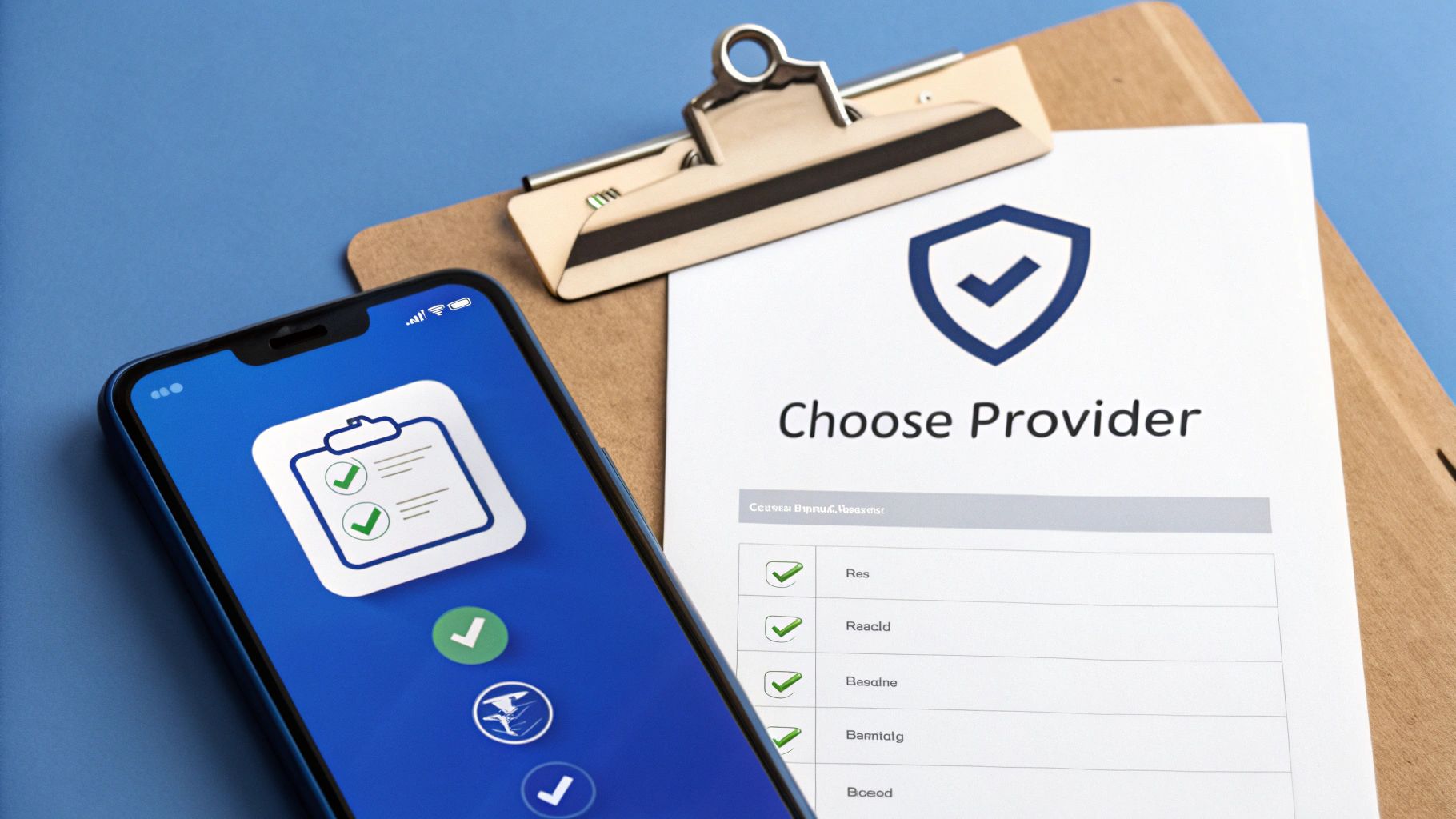
Even after covering the ins and outs, it’s completely normal to have a few lingering questions before you dive into a mail forwarding service in the UK. Getting these final details sorted is key to feeling confident about your choice.
To help clear up any last bits of uncertainty, we’ve gathered the most common queries we hear and answered them directly. Think of this as the final piece of the puzzle, covering everything from legal standing to the nitty-gritty of daily operations.
Is Using a Mail Forwarding Service Legal for My UK Business?
Yes, absolutely. Using a mail forwarding service is a completely legal and widely accepted business practice in the UK. Any reputable provider will be registered with HMRC as a Company Service Provider, meaning they must follow strict Anti-Money Laundering (AML) regulations.
This registration isn’t just a formality; it’s your assurance of a legitimate service. It means the provider is legally required to carry out identity checks (often called ‘Know Your Customer’ or KYC) on every client they take on.
These rules ensure the whole operation is transparent and helps your business tick all the right boxes with Companies House. Most importantly, it gives you a professional address to use publicly while keeping your private home address off the official register.
What Types of Mail Can I Receive?
Pretty much anything that would normally land on your doormat. This includes official government letters from HMRC and Companies House, bank statements, client invoices, general business correspondence, and even parcels from your online shopping.
However, for obvious safety and legal reasons, there are always a few restrictions. Providers won’t accept illegal items, hazardous materials, perishable goods, or live animals. It’s common sense, really.
It’s also a smart idea to quickly check the provider’s specific terms for any size and weight limits on parcels. A quick look beforehand can save you from any delivery headaches or unexpected return fees down the line.
One of the biggest advantages is the sheer flexibility. Whether it’s a crucial tax document, a new bank card, or a business-to-business delivery, a mail forwarding service consolidates everything into a single, manageable stream that you control from anywhere.
The logistics powering these services are getting more sophisticated all the time. The UK parcel delivery market is set to grow by over 4% annually through to 2033, driven by our demand for quicker, more reliable deliveries. This pushes providers to adopt better tech to speed things up. You can discover more insights about the evolving UK parcel delivery market on datainsightsmarket.com.
How Quickly Is Mail Processed and Sent to Me?
Speed is where a quality service really shows its worth. Most top-tier providers will process all incoming mail the very same day it arrives at their centre.
If you’ve chosen a plan with mail scanning, you can often expect a secure digital copy in your online portal within a matter of hours. This is a game-changer for time-sensitive documents that you need to act on immediately.
For physical mail that’s being forwarded on, the delivery time is all down to the postal option you select. You’ll typically have a choice between services like Royal Mail 1st Class for UK post or an international courier for sending items abroad, letting you balance speed against cost.
Can I Use This Service for Personal Use?
Of course. Mail forwarding isn’t just for businesses; it’s incredibly popular with individuals, too. It provides an elegant solution for all sorts of personal situations.
Here are just a few common scenarios:
- UK Expats: Having a reliable UK address is vital for keeping in touch with UK banks, pension providers, or government bodies like the DVLA.
- Digital Nomads: It gives you a stable UK postal base for official mail, letting you travel the world without worrying about what you’re missing.
- Frequent Travellers: You can manage your personal post securely from anywhere, so you never miss an important bill or letter while you’re on the move.
The sign-up process for a personal account is almost identical to a business one. You will still need to provide ID to comply with the same AML regulations, which keeps the service secure and trustworthy for everyone.
Ready to gain control over your mail with a professional UK address? At Acorn Business Solutions, we offer secure, flexible, and affordable mail forwarding and virtual office services designed for modern businesses, expats, and individuals. Protect your privacy and manage your post from anywhere in the world.
Explore our mail forwarding plans and get started today at acornbusinesssolutions.com





